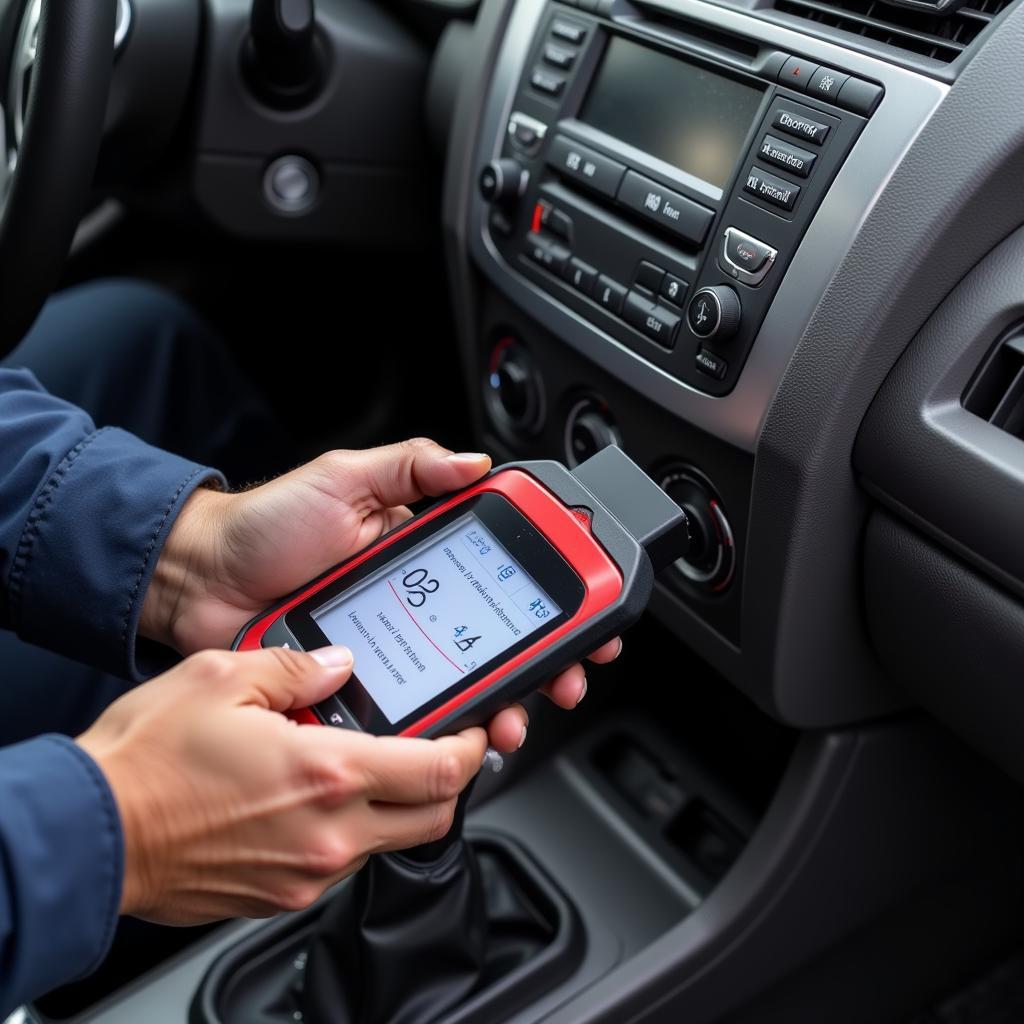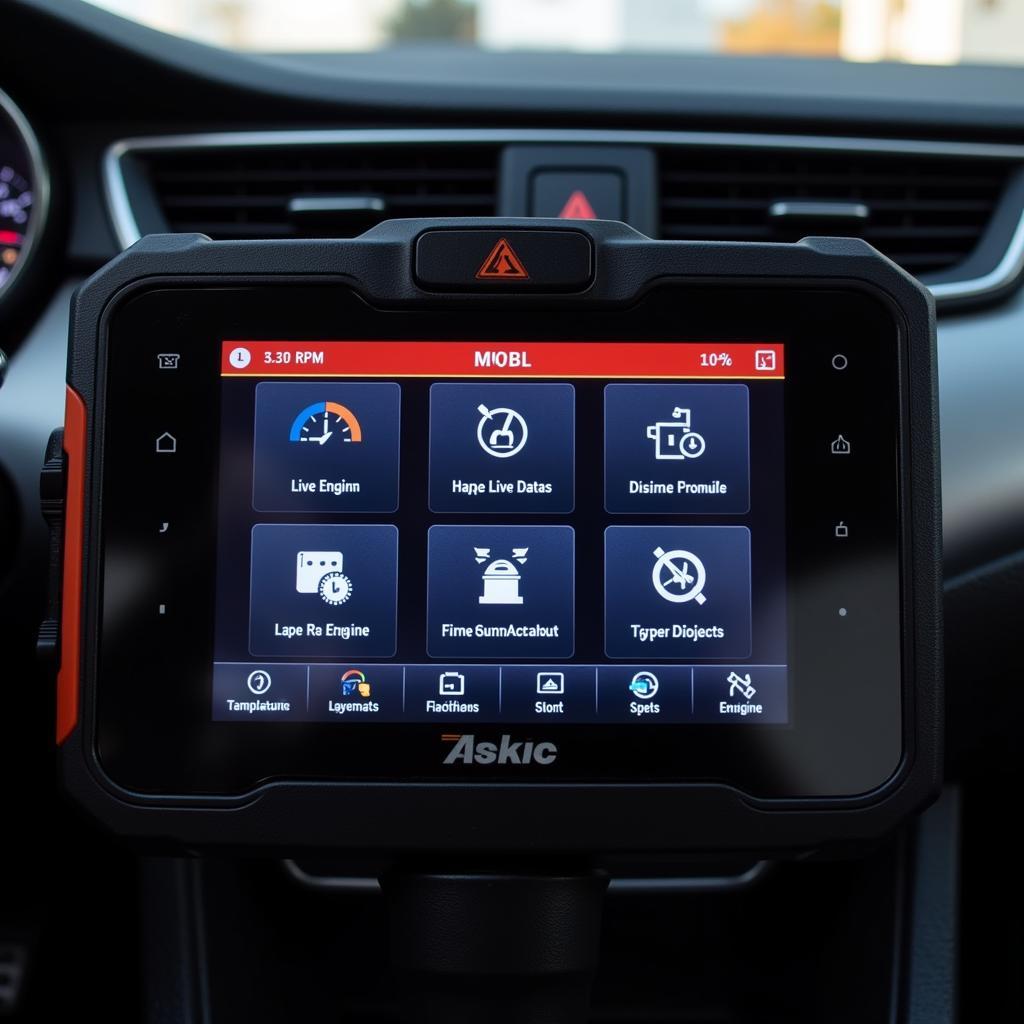Choosing the Best Rated Car Diagnostic Tool can feel overwhelming with countless options flooding the market. Whether you’re a seasoned mechanic or a car enthusiast, having a reliable diagnostic scanner can save you time, money, and unnecessary headaches. This comprehensive guide will walk you through everything you need to know to find the perfect tool to meet your specific needs.
Understanding Car Diagnostic Tools: What to Look For
Before diving into specific products, it’s crucial to understand what features and functionalities are essential in a top-tier car diagnostic tool. Here are some key factors to consider:
- Vehicle Compatibility: Ensure the tool supports your car’s make, model, and year. Look for scanners with wide vehicle coverage, especially if you work on various vehicles.
- Diagnostic Capabilities: Determine the level of diagnostic depth you require. Some tools offer basic code reading and clearing, while others provide advanced functionalities like live data streaming, bi-directional controls, and ECU programming.
- User Interface: Opt for a tool with an intuitive and user-friendly interface. A clear display, easy navigation, and well-organized menus can significantly enhance your user experience.
- Durability and Build Quality: Since you’ll be using this tool in potentially harsh environments, ensure it’s built to last. Look for sturdy construction, shock resistance, and protection against dust and moisture.
- Software Updates: The automotive industry constantly evolves, so choosing a tool with regular software updates is crucial. This ensures compatibility with the latest vehicle models and access to the newest features.
- Price and Value: Diagnostic tools come in a wide price range. Determine your budget and look for a tool offering the best value for its price point. Consider long-term costs like software subscriptions.
 Mechanic using a car diagnostic scanner
Mechanic using a car diagnostic scanner
Types of Car Diagnostic Tools
The market offers a wide array of car diagnostic tools, each catering to different needs and budgets. Here are the most common types:
- Code Readers: These entry-level tools primarily read and clear basic diagnostic trouble codes (DTCs). They are budget-friendly and suitable for DIYers looking to diagnose simple issues.
- OBD-II Scanners: A step up from code readers, OBD-II scanners provide more detailed diagnostic information, including live data streams, freeze frame data, and emissions readiness status.
- Professional-Grade Scan Tools: These high-end tools offer advanced functionalities like bi-directional controls, ECU programming, and coding. They are typically used by professional mechanics and automotive technicians.
- Smartphone/Tablet-Based Scanners: These tools connect to your smartphone or tablet via Bluetooth, offering a portable and convenient diagnostic solution. They vary in capabilities depending on the app and adapter used.
Top Features for the Best Rated Car Diagnostic Tool
To qualify as a top-rated car diagnostic tool, certain features are non-negotiable. These include:
- Comprehensive Code Library: The tool should have an extensive database of DTCs, providing detailed descriptions and potential solutions for accurate diagnoses.
- Live Data Streaming: Real-time monitoring of various engine parameters like RPM, speed, coolant temperature, and oxygen sensor readings enables you to pinpoint issues effectively.
- Bi-Directional Controls: This feature allows you to interact with and control vehicle components, such as turning on/off fuel injectors or activating solenoids, for advanced troubleshooting.
- ECU Programming and Coding: For professional use, the ability to reprogram or code ECUs is essential for software updates, module replacements, and advanced vehicle customizations.
- Data Logging and Reporting: Being able to log diagnostic data and generate reports is invaluable for tracking issues over time, sharing information with others, or providing documentation for repairs.
 Display screen of a car diagnostic tool showing various features.
Display screen of a car diagnostic tool showing various features.
Choosing the Right Tool for Your Needs
Selecting the best car diagnostic tool depends on your specific requirements and expertise.
For DIY Enthusiasts:
If you’re a car enthusiast looking to perform basic diagnostics and maintenance, a best car diagnostics scanner between 200 400 uk or a reliable OBD-II scanner with live data capabilities would be a suitable choice. These tools provide sufficient functionality for diagnosing common issues and resetting warning lights.
For Professional Mechanics:
Professional mechanics require advanced diagnostic tools with comprehensive functionalities like bi-directional controls, ECU programming, and extensive vehicle coverage. Consider investing in a professional-grade scan tool from reputable brands like Autel, Launch, or Snap-on.
For Specialized Applications:
Certain diagnostic tools cater to specific vehicle makes or models. For instance, if you primarily work on BMWs, investing in the best car diagnostic tool for bmw ensures optimal compatibility and functionality.
Expert Insight:
“Investing in a high-quality diagnostic tool is crucial for anyone serious about car maintenance or repair. It’s like having a window into your car’s brain, allowing you to understand and address issues effectively.” – John Miller, Automotive Engineer
Conclusion
Finding the best-rated car diagnostic tool requires careful consideration of your needs, budget, and the tool’s features. By understanding the key factors and exploring the different types available, you can make an informed decision. Remember, a reliable diagnostic tool is an invaluable investment that can save you time, money, and frustration in the long run.

Leave a Reply